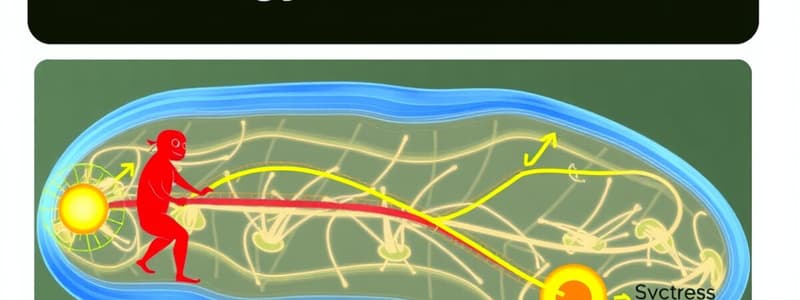Podcast
Questions and Answers
What functional group is commonly used in cells to transfer energy from one organic molecule to another?
What functional group is commonly used in cells to transfer energy from one organic molecule to another?
Phosphate
Which of the following hydrocarbons has a double bond in its carbon skeleton?
Which of the following hydrocarbons has a double bond in its carbon skeleton?
- C2H4 (correct)
- C3H8
- C5H12
- C4H10
Which of the functional groups is most likely to gain a proton and become positively charged?
Which of the functional groups is most likely to gain a proton and become positively charged?
Amino group
What does an amino group do in biological molecules?
What does an amino group do in biological molecules?
The large diversity of shapes of biological molecules is possible because of the extensive presence of _____ in the molecules.
The large diversity of shapes of biological molecules is possible because of the extensive presence of _____ in the molecules.
What enables carbon-based molecules to be multibranching and three-dimensionally variable?
What enables carbon-based molecules to be multibranching and three-dimensionally variable?
Which of the following is a hydrocarbon?
Which of the following is a hydrocarbon?
Molecules that have the same chemical formula but different shapes are called _____.
Molecules that have the same chemical formula but different shapes are called _____.
Which molecules show an appropriate number of bonds around each carbon atom? (Select the three that apply)
Which molecules show an appropriate number of bonds around each carbon atom? (Select the three that apply)
What is a functional group?
What is a functional group?
What are some examples of biologically important functional groups?
What are some examples of biologically important functional groups?
Study Notes
Functional Groups and Their Roles
- Phosphate groups are crucial for energy transfer in cells, particularly in the formation and usage of ATP and ADP.
- Amino groups can accept protons, rendering them positively charged and acting as bases in chemical reactions.
Hydrocarbons and Their Structures
- C2H4 features a double bond in its carbon skeleton, highlighting its classification as an unsaturated hydrocarbon.
- C3H8 exemplifies a hydrocarbon with single covalent bonds, adhering to the formula where the number of hydrogen atoms equals twice the number of carbon atoms plus two.
Carbon's Versatile Binding
- Carbon has four outer electrons, enabling it to form diverse structures, including branches and complex three-dimensional shapes.
- Carbon's tetravalency allows it to bond with various other atoms, contributing to the vast array of organic molecules.
Isomers and Molecular Structures
- Isomers are molecules with identical chemical formulas but distinct three-dimensional configurations, influencing their chemical properties.
- Functional groups influence the chemical behavior of molecules, with common types including hydroxyl, carbonyl, carboxyl, amino, sulfhydryl, and phosphate groups.
Identifying and Classifying Functional Groups
- Functional groups replace hydrogen atoms in hydrocarbons, with specific arrangements conferring distinct chemical properties.
- Alcohol (-OH) is polar and may act as a weak acid, while carboxylic acids can donate protons (acids).
- Thiols (-SH) can form disulfide bonds, and amines (-NH2) serve as basic functional groups.
- Phosphate groups, essential for ATP structure, provide a negative charge, impacting molecular interactions.
Importance in Biological Systems
- The ability of carbon to form chains, rings, and diverse bonding patterns makes it foundational to organic chemistry and essential for all living organisms.
- Understanding the behavior of functional groups helps in predicting the reactivity and interaction of biological molecules.
Studying That Suits You
Use AI to generate personalized quizzes and flashcards to suit your learning preferences.
Description
Test your knowledge with these flashcards covering key concepts from Chapter 4 of Biology. Each card presents a term along with its definition, helping you reinforce your understanding of important biological functions and structures. Perfect for students preparing for exams or wanting to master the material!




